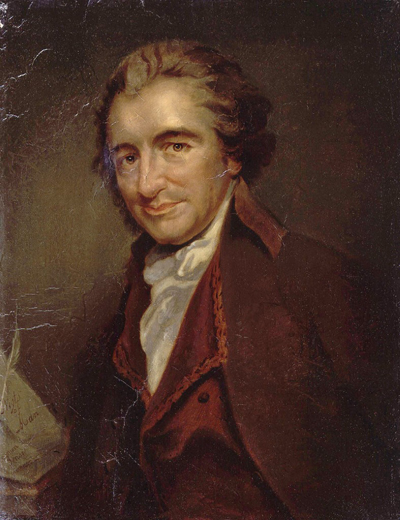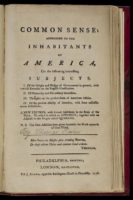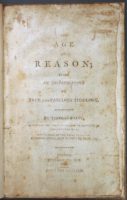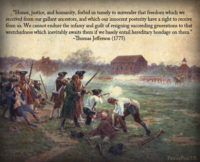 “… if the journalistic credos of speaking truth to power, comforting the afflicted, and afflicting the comfortable have a godhead, that would have to be Paine, whose writing was so provocative and so uncompromising that he faced the gibbet and the blade everywhere he published—in England, and in France, and in the United Colonies.” ~ Craig Nelson
“… if the journalistic credos of speaking truth to power, comforting the afflicted, and afflicting the comfortable have a godhead, that would have to be Paine, whose writing was so provocative and so uncompromising that he faced the gibbet and the blade everywhere he published—in England, and in France, and in the United Colonies.” ~ Craig Nelson
Thomas Pain (later changed to Paine) was born on January 29, 1737 in Thetford, England, his 40-year-old Anglican mother the daughter of a popular local lawyer, his 29-year-old Quaker father a destitute master craftsman staymaker. In Thetford the Pains lived within sight of the local hanging ground called Gallows Hill. Paine biographer Craig Nelson tells us…
The most popular entertainment of the age was the thrill of the hangman’s noose, with executions the only public holidays for workers besides Christmas and Easter, thus allowing apprentices, servants, and the working poor to mull the consequence of villainy.
In eighteenth century England “villainy” among the politically powerless included some 200 crimes punishable by death. Steal a box of tea or a handkerchief and you could be facing the hangman’s noose, even if you were starving.
As was true in England as a whole, 5 percent of Pain’s neighbors were aristocrats and gentry (doctors, lawyers, and landowning yeomen and clergy), while 95 percent were rural paupers trying to survive the enclosure movement, when common folk were suddenly forbidden to graze their herds, hunt, or forage on 3.4 million acres of now private grounds.
Though baptized as an Anglican, Thomas Pain would often accompany his father to the local Quaker meetinghouse, adjacent to which were “the cage, pillory, and stocks for the condemned overflow of Thetford prison.” Thus, the prayer and testimony of the Quaker gathering would be mixed with “bellowing wails, screams for mercy, and the taunts of locals having a grand old time tormenting the criminals on public display next door.”
Thomas began grammar school at age six and quit at age 12 to begin an apprenticeship in staymaking. Seven years later (1756) the Seven Years’ War was underway, with the English and its allies fighting the French and their supporters. Pain left home and joined the crew of a privateer warship that succeeded in capturing “the treasure of eight enemy vessels in as many months,” providing him with a handsome commission for his service.
While most successful privateers spent their winnings on women and clothes, Pain bought a pair of globes and began attending philosophical lectures in London.
Historians have long wondered exactly how this lower-class rarely-do-well became the most popular author of the eighteenth century and famed citizen of the world. He did it, we now know, in a signature American fashion a rigorous course of self-improvement leading to personal reinvention – inspired by one of the most remarkable transformations of thought in world history. Thomas Pain would spend only a few years in London, but they would make of him a central figure in the creation of the modern world.
Pain later married but his wife and child died during childbirth. He married again but following a financial collapse he and his second wife Elizabeth Ollive agreed to a separation, though they were never divorced. Pain’s bankruptcy came during his stint as an excise taxman when he abandoned his post in Lewes and went to London to petition Parliament for better pay for excise tax collectors. There he distributed copies of his pamphlet The Case of the Officers of Excise, which though compelling in many ways stood in contradistinction to his later essays against government and especially its taxes. It was largely ignored. “Between the public’s loathing of the Excise and the government’s interest in paying its employees as little as possible, this noble campaign was a fool’s errand,” Nelson writes.
When he returned to his post in Lewes, Pain was fired and arrested for debt. He sold assets in a business he and his wife ran to pay his creditors, and Elizabeth went home to live with her parents. Neither one ever remarried, and both lived into their seventies, dying only eight months apart.
When Pain in later life learned that the Ollives were having financial troubles, he would anonymously send Elizabeth money, and when Elizabeth had the opportunity to pocket a tidy sum by agreeing to take part in the British government’s drive to vilify her ex-husband, she would categorically refuse.
With personal bankruptcy, loss of his job, and the breakup of his marriage, Pain, age 37, had reached the nadir of his life.
He did not know it at the time, but this seemingly unconquerable mountain of failure would force him to risk all, to take a very great leap of faith that would lead to his immortality.
Or as another biographer said about him with memorable flair: “When the British fired Thomas Paine, it cost him his marriage, but it cost the British their American colonies.”
 Shortly after and with Ben Franklin’s blessing, Paine ventured to America, began writing, and achieved everlasting fame and notoriety. His 1776 pamphlet Common Sense set the colonists on fire for independence. According to Wikipedia, “In proportion to the population of the colonies at that time (2.5 million), it had the largest sale and circulation of any book published in American history. As of 2006, it remains the all-time best selling American title, and is still in print today.”
Shortly after and with Ben Franklin’s blessing, Paine ventured to America, began writing, and achieved everlasting fame and notoriety. His 1776 pamphlet Common Sense set the colonists on fire for independence. According to Wikipedia, “In proportion to the population of the colonies at that time (2.5 million), it had the largest sale and circulation of any book published in American history. As of 2006, it remains the all-time best selling American title, and is still in print today.”
He followed Common Sense with a series of essays called The American Crisis that attempted to raise American spirits during the war.
 THESE are the times that try men’s souls. The summer soldier and the sunshine patriot will, in this crisis, shrink from the service of their country; but he that stands it now, deserves the love and thanks of man and woman. Tyranny, like hell, is not easily conquered; yet we have this consolation with us, that the harder the conflict, the more glorious the triumph.
THESE are the times that try men’s souls. The summer soldier and the sunshine patriot will, in this crisis, shrink from the service of their country; but he that stands it now, deserves the love and thanks of man and woman. Tyranny, like hell, is not easily conquered; yet we have this consolation with us, that the harder the conflict, the more glorious the triumph.
Returning to England after the war to find a builder for an iron bridge he had designed, he wrote Rights of Man, in two parts, as a rebuttal of Reflections on the Revolution in France by Edmond Burke. “Like Hamilton, Burke believed that only the nation’s elite should be involved in the affairs of state, which in his mind meant not just the rich and the landed but chivalric nobles, and clearly not common tradesmen,” Nelson explains.
In Rights, Paine points out that government by elites or anyone is unnecessary:
For upwards of two years from the commencement of the American War, and to a longer period in several of the American States, there were no established forms of government. The old governments had been abolished, and the country was too much occupied in defence to employ its attention in establishing new governments; yet during this interval order and harmony were preserved as inviolate as in any country in Europe. There is a natural aptness in man, and more so in society, because it embraces a greater variety of abilities and resource, to accommodate itself to whatever situation it is in. The instant formal government is abolished, society begins to act: a general association takes place, and common interest produces common security.

Battle of Lexington
Later as a condemned prisoner under Robespierre, he penned the first volume of his The Age of Reason in which he presented his deistic view of the Bible and organized religion:
I do not believe in the creed professed by the Jewish church, bythe Roman church, by the Greek church, by the Turkish church, by the Protestant church, nor by any church that I know of. My own mind is my own church.
All national institutions of churches, whether Jewish, Christian or Turkish, appear to me no other than human inventions, set up to terrify and enslave mankind, and monopolize power and profit.
He died all but forgotten at age 72, on the morning of June 8, 1809, in Greenwich Village, New York City, after suffering from a long, devastating illness.
As an afterword, Paine published his final installment of The Crisis on April 19, 1783, coinciding with the firing of the first shots in Lexington eight years earlier, saying that “The times that tried men’s souls are over.”
No, they are never over.
Written by George F. Smith for Barbarous Relic ~ January 28, 2019
